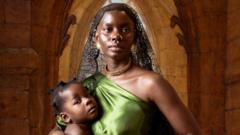Dola Posh has multiple identities: Photographer; woman; Nigerian; mother; Briton. Yet after giving birth, she no longer felt sure who she was. Six days after her daughter was born, she was lying in a bed in an English hospital in the midst of a COVID lockdown. She worried about how her life had changed and if she would ever again do what she loved - taking pictures. Unable to visit, relatives kept on calling to check up on her and the baby. After a difficult pregnancy, Dola felt under pressure. Her mother was thousands of miles away in the place she had left two years earlier – Lagos, Nigeria's biggest city. All this put her “brain in a very dark place… I thought: ‘I’m me; the baby’s out, I’m still me.’ But no, I wasn’t me any more.” The loss of identity can be one of the causes of postnatal depression, which disproportionately affects black women. Though she did not recognize it at the time, this was what Dola was suffering from.
After leaving the hospital, Dola began receiving unsolicited parenting advice that clouded her confidence. She reflected on the isolation and lack of sleep overwhelming her, leading her to a dark moment where she contemplated ending her life. Throughout her struggles, she found solace in photography, using her camera to document her journey – particularly her relationship with her baby, Monioluwa. Dola’s portrait series began to combine traditional images of motherhood with her personal narrative. By revisiting her Nigerian heritage, she incorporated symbols and themes from her upbringing into her work.
Therapy and photography became vital to her healing process, allowing her to reclaim her identity and share her story. "When I started to open up about my experience, it lifted the shame,” she states. Dola wants other black mothers to see reflections of their struggles in the media, seeking to normalize conversations around postnatal depression. Recently awarded by Leica, she strives to empower women through her art and address the stigma surrounding mental health for black mothers. “It’s important for women to know they are not alone in their journey,” she emphasizes.
After leaving the hospital, Dola began receiving unsolicited parenting advice that clouded her confidence. She reflected on the isolation and lack of sleep overwhelming her, leading her to a dark moment where she contemplated ending her life. Throughout her struggles, she found solace in photography, using her camera to document her journey – particularly her relationship with her baby, Monioluwa. Dola’s portrait series began to combine traditional images of motherhood with her personal narrative. By revisiting her Nigerian heritage, she incorporated symbols and themes from her upbringing into her work.
Therapy and photography became vital to her healing process, allowing her to reclaim her identity and share her story. "When I started to open up about my experience, it lifted the shame,” she states. Dola wants other black mothers to see reflections of their struggles in the media, seeking to normalize conversations around postnatal depression. Recently awarded by Leica, she strives to empower women through her art and address the stigma surrounding mental health for black mothers. “It’s important for women to know they are not alone in their journey,” she emphasizes.




















